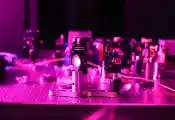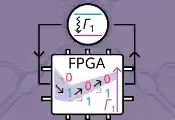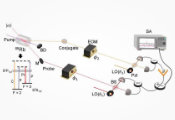SandboxAQ’s AQMed Reflects on a Year of Scientific and Technical Achievements
Palo Alto, CA, December 23, 2024 -- SandboxAQ is proud to announce a year of exceptional progress and innovation from its AQMed division. Combining artificial intelligence with advanced sensors, AQMed empowers clinicians to make faster and more accurate heart health decisions. This transformative work has been featured in the McKinsey report Quantum Sensing’s Untapped Potential: Insights for Leaders and highlighted by AQMed GM Dr. Kit Yee Au-Yeung during The Economist’s Commercialising Quantum Global 2024 and in the World Economic Forum’s Quantum for Society: Meeting the Ambition of the Sustainable Development Goals. Today, AQMed reflects on its technical milestones that are paving the way for improved patient care.
Point-of-Care Diagnostics with Innovative Magnetocardiography Hardware
At the Conference on Lasers and Electro-Optics in Charlotte, NC, and Sensors Converge in Santa Clara, CA, AQMed Hardware Lead Dr. Ethan Pratt emphasized that although the “quantum revolution” is often associated with computing—a field still in the early stages of delivering tangible results—the revolution in sensing is already making an impact. Dr. Pratt highlighted AQMed’s application-first, customer-first approach, which ensures its sensor portfolio evolves directly in response to unmet needs. This contrasts with traditional technology-first strategies, which often result in suboptimal outcomes.
Dr. Pratt underscored that the sensing revolution must be paired with AI innovation to denoise richer datasets and extract actionable insights. As an example, Pratt pointed to SandboxAQ’s magnetocardiography (MCG) prototype, CardiAQ, which is currently deployed in busy hospital environments across the US, demonstrating substantial progress in addressing critical real-world challenges.
A significant milestone was AQMed’s publication in MDPI Sensors, detailing the first-of-its-kind unshielded MCG built around an array of quantum sensors (optically pumped magnetometers). CardiAQ effectively rejects ambient magnetic interference, enabling high-quality cardiac magnetic field mapping at the patient’s bedside.
Additionally, Dr. Stefan Bogdanovic, AQMed Strategic Innovation Lead, presented at a QED-C and NIH workshop in Washington, D.C., on the commercialization of quantum sensors. He stressed the importance of user-centric development, iterative testing, and navigating the complexities of the medtech landscape to ensure successful adoption.
Vast opportunities await when applying AI to Magnetocardiography
AQMed Data Science Lead Dr. Kirstin Aschbacher contributed to the Frontiers of Cardiovascular Medicine special issue on advancements in magnetocardiography. Her editorial explored the transformative role of AI in capturing complex spatial-temporal patterns in cardiac activity, using deep learning architectures such as convolutional and recurrent neural networks. These methods bring physicians closer to achieving real-time clinical decision support.
Breakthrough Clinical Results in Emergency Cardiac Care
Dr. Jefferey Bander, Chief of Cardiology at Mount Sinai West Hospital, presented results at the American Heart Association (AHA) Scientific Sessions from a joint clinical study with AQMed.
This abstract reports results from 78 adult patients presenting to the emergency department with chest pain symptoms suggestive of acute coronary syndrome (ACS) but not experiencing STEMI. CardiAQ’s signal processing and AI algorithms were used to remove ambient interference and recover and classify the cardiac signals. Key results include:
- AI algorithms successfully discriminated clinically determined ACS rule-in patients (n=7) from rule-outs (n=65) with a sensitivity of 86% and specificity of 92%.
- This pilot study shows that a bedside, quantum-sensing MCG that utilizes AI has the potential to provide safe and accurate diagnostic results, and it is feasible to integrate the device into the ED workflow.
Clinical Partnerships
The AQMed team has scanned over 200 patients across three hospitals with zero reported adverse events. A partnership with the Mayo Clinic is underway to examine correlations between MCG and angiographic findings in a study involving 150 patients. Additionally, ongoing collaborations with Mount Sinai Hospital include two clinical studies focused on advancing cardiac diagnostics. “The CardiAQ device shows how AI and this next generation of sensing technologies could revolutionize cardiac diagnosis and address the unmet clinical need for more effective patient care. This is the future of medicine”, said Dr. Toby Cosgrove, cardiac surgeon and former president/ CEO of Cleveland Clinic.
Looking Ahead
SandboxAQ’s AQMed division is committed to advancing quantum sensing and AI technologies to revolutionize cardiac diagnostics. Future efforts will focus on expanding clinical datasets, enhancing model interpretability, and addressing generalization challenges to ensure robust performance across diverse patient populations. As testing continues with clinical partners, AQMed will also explore additional MCG use cases for cardiology and expand its AI-driven magnetic sensing capabilities to analyze other tissue types.
Highlighting its global potential, SandboxAQ is showcasing CardiAQ on the World Economic Forum’s Quantum Application Hub, where policymakers and industry leaders can experience firsthand how this next-generation MCG system provides actionable clinical insights and addresses significant barriers in cardiovascular diagnostics. This participation underscores AQMed’s commitment to elevating patient care and fostering equity by enabling scalable, portable, and cost-effective solutions for healthcare systems worldwide.




































